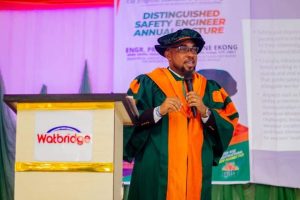ILO, NISafetyE others commend Governor Umo Eno on Safety Policies in the State
The International Labour Organization Country Director for Nigeria, Liberia, Ghana and Sierre Leone, Dr Vanessa Phala- Moyo, in her goodwill message during the Distinguished Safety Engineers Annual Lecture organized by the Nigerian Institution of Safety Engineers (NISafetyE), has commended the Akwa Ibom State Governor, Pastor Umo Eno on Safety Policies and for the positive developments in the State as reported in a letter written to ILO by Engr Prof Akaninyene Ekong, Immediate Past National Chairman of NISafetyE who also doubles as the Head Governmental Relations of NISafetyE.
The ILO Director sympathized with the Governor on the demise of his wife, Pastor Mrs. Patience Umo Eno.
In his lecture with the theme “Integrating Safety and Disaster Risk Management into Sustainable Infrastructural Development: The Akwa Ibom State Perspective; Prof. Akaninyene Ekong who recently bagged a Professorial Chair in Safety and Disaster Management, the first African in that specific field, is a renowned Project Manager, Marine Operations and Safety Specialist. He is currently the Senior Special Assistant to the Governor on Projects/Director of Projects Ibom Deep Seaport.
The event held at Watbridge Hotel, Uyo on 28 September 2024, had in attendance delegates from all over the country.
The lecture focused on identifying the links between Safety and Disaster Risk Management in ensuring sustainable infrastructural development thus laying the groundwork for improving safety and disaster risk management performance in Akwa Ibom State.
Ekong listed Education and training, Safety evaluation, Management Commitment to Safety, Safety Policy and Organization Compliance to Standards, Safety Inspection and Accident Reporting as factors to consider in building a resilient safety culture.
He also listed barriers to achieving disaster risk reduction as Political Will, Institutional Capacity, Coordination and Collaboration, Social and Cultural factors, Data and Information including Awareness and Education.
The following recommendations were made:
1. Creation of a uniform short code (emergency call number) for the State such as 911 and link it to Police, Fire Service, Medical/ Ambulance Services etc.
2. Engagement of Engineers as Safety personnel in Engineering related Ministries Departments and Agencies based on application of their core competencies.
3. Adoption of the NISafetyE approved code of practice for Construction Safety in construction/infrastructure projects.
4. Formal inauguration of the State Technical Committee on Engineering Monitoring and Regulation (COREN STC) to ensure monitoring and compliance to standards in Construction.
5. Amendment of the Akwa Ibom State Infrastructure and Asset Management and Maintenance Agency Act 2024 to include the word Safety in the title. Akwa Ibom State Infrastructure Asset Management, Maintenance and Safety Agency. This will give the Safety Department within the needed visibility and powers of engagement.The scope of operations of the Agency should be broaden beyond the Civil Service and cover the entire State.
6. Procurement of critical rescue equipment for the Fire Service.
7. Training of civil servants across all Government Ministries and Agencies.
8. Inclusion of Safety and compliance to Safety in all Government Contracts.
9. Disaster Risk related agencies such as Humanitarian Affairs should synergize promote education, awareness and disaster risk reduction strategies.
The Lecturer concluded by stating that no major development happens to a people until they arise, go forward and work collectively with Government as stakeholders and development partner, taking ownership, protecting natural resources/public infrastructure while ensuring compliance to safety standards in public and private sector driven activities.



